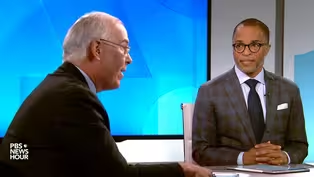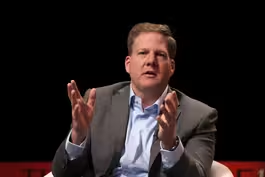
How Biden is canceling student loan debt for millions
Clip: 1/19/2024 | 6m 31sVideo has Closed Captions
After Supreme Court ruling, Biden cancels student loan debt for millions of borrowers
President Biden on Friday announced another $5 billion in student loan forgiveness for 74,000 borrowers. It’s the latest batch of student debt cancellations after the Supreme Court struck down his larger forgiveness plan last year. John Yang reports on Biden's efforts and speaks with Danielle Douglas-Gabriel, who covers the economics of higher education for The Washington Post, to learn more.
Problems playing video? | Closed Captioning Feedback
Problems playing video? | Closed Captioning Feedback
Major corporate funding for the PBS News Hour is provided by BDO, BNSF, Consumer Cellular, American Cruise Lines, and Raymond James. Funding for the PBS NewsHour Weekend is provided by...

How Biden is canceling student loan debt for millions
Clip: 1/19/2024 | 6m 31sVideo has Closed Captions
President Biden on Friday announced another $5 billion in student loan forgiveness for 74,000 borrowers. It’s the latest batch of student debt cancellations after the Supreme Court struck down his larger forgiveness plan last year. John Yang reports on Biden's efforts and speaks with Danielle Douglas-Gabriel, who covers the economics of higher education for The Washington Post, to learn more.
Problems playing video? | Closed Captioning Feedback
How to Watch PBS News Hour
PBS News Hour is available to stream on pbs.org and the free PBS App, available on iPhone, Apple TV, Android TV, Android smartphones, Amazon Fire TV, Amazon Fire Tablet, Roku, Samsung Smart TV, and Vizio.
Providing Support for PBS.org
Learn Moreabout PBS online sponsorshipfor 74,000 borrowers.
It's the latest# batch of student debt cancellations## after the U.S. Supreme Court struck down# his larger forgiveness plan last year.
John Yang has our update# on the president's efforts.
JOHN YANG: Geoff, today's move# will provide relief to nurses,## teachers and other public service employees who# have been workin includes forgiveness for some borrowers who# have been making loan repayments for 20 years,## but never got the relief they were# entitled to under existing programs.
And earlier this week, the administration# said it will move up the start date of a## new student loan repayment program from July to# February.
So far, the Biden administration say it's erased more than $130 billion# in loans for 3.7 million borrowers.
Danielle Douglas-Gabriel covers the economics# of higher education for The Washington Post.
Danielle, two announcements today, one# a program for public service workers,## another for people who have been repaying# their student loans for 20 years,## but haven't gotten the benefits that they# were entitled to.
How does that work?
DANIELLE DOUGLAS-GABRIEL,# The Washington Post: Sure.
programs.
These are programs that allow you# to pay based on your -- a portion of your## discretionary earnings.
This is supposed to# allow you to have more affordable payments,## make it easier for folks to manage their loans.
Now, the promise as a part of these programs# is, after you can get forgiveness for whatever your# balance is on these loans.
Unfortunately,## the Education Department for many years# weren't keeping count of how many people## actually were making payments# on those loans during that time.
So there were hundreds of thousands of people# for whom they'd many more years than that and never received this# benefit.
So, the Biden administration came in and## said, we're going to play cleanup, essentially.# They extended these initiatives that made it## a lot easier for people who had been paying# for decades to have their loan forgiveness.
And the news of this today is what# we're seeing as a result of this effort.
JOHN YANG: And also the program that they're# moving up the start date from July to February,## what does it do and how significant is it?
DANIELLE DOUGLAS-GABRIEL: This is all rooted## in Biden's latest And one of the cool features of this plan# is that, if you borrowed less than $12,000## originally and had been making payments for# 10 years, whatever your remaining balance## is would be forgiven.
So the Department# of Education was supposed to put that## particular feature into effect in July, but# they were able to move it up to February.
They are not certain exactly how many people# will benefit from this, but do keep in mind,## there are a lot of people who borrowed less than# $10,000 who owe far more than that because of the## way interest accumulated on their loans.
And# a lot of those people tend to be at the center## of where we see the most pain in student loan# repayments, meaning the people who default the## most, people who are delinquent on their loans,# oftentimes because they started college, never## finished and got the credential needed to get the# kind of work to make it easy to repay the debt.
JOHN YANG: Talk about the pain of# student loans.
This is an election## year.
Polls show that voters under# 45 think thi loan forgiveness is a big issue.
And they# also feel that Biden isn't doing enough.
Is this piecemeal approach that the president's# taking now that the Supreme Court struck down## his bigger program, is this enough for# borrowers?
Are they satisfied with this?
DANIELLE DOUGLAS-GABRIEL: We're not# seeing that, which I find striking, right?
I mean, relative to any other administration in# rece the most amount of student debt.
But because# of the failed promise of this widespread debt## relief that would have touched 40 million people,# a lot of borrowers still aren't fully satisfied.
Certainly, the ones who are benefiting# from these incremental approaches,## they're pretty happy right now, because they don't# have to make pay vast majority, they're still trying to push for# something that may not quite happen.
I mean,## to be fair, the Biden administration# is still fighting for more expansive## loan forgiveness through this negotiated# rulemaking process that's still under way.
But it's not what folks were hoping for.
And it's## certainly not what he -- I think many# people thought he could have delivered.
JOHN YANG: We go from loan repayment# to getting the student loans.
The Biden administration also rolled out the# new Free Application for al so known as FAFSA.
They did that at the# beginning of the year.
How's it going?
DANIELLE DOUGLAS-GABRIEL: A# lot better than it started.## I think we have more than a million# peop which is great.
A lot of the technical# troubles that people experienced on January 1,## December 31 have largely dissipated, from# what I'm hearing from folks on the ground.
But there are still some technical issues# that some applicants are facing when their## parents try to get a FAFSA I.D., especially if# they don't have Social Security numbers.
This## was a feature that was supposed to make# it easier for a wider swathe of folks,## but it hasn't fully worked# out, from what I'm hearing.
I think the challenge is, filling out the form# is one step.
There are other steps and all of those delays, it kind# of has a domino effect.
And so a## lot of folks in financial aid are# waiting to see how this plays out.
JOHN YANG: And financial aid has to# decide what they can offer students,## and students have to figure out# where they can afford to go.
But this is getting pushed back?
DANIELLE DOUGLAS-GABRIEL: Yes, so here's# the trouble, i everyone can submit their application now, the# department may not be able to co lleges that information and that data until# the end of this month, if not potentially later.
And that creates a much shorter timeline for# financial aid officers at schools to be able## to provide award packages.
It also creates the# complication of missing potential state and other## outside scholarship deadlines that require# the FAFSA in order to apply for that money.
So everyone is really nervous about,# how will students and families be able## to get this information to make an# educated decision about where to go,## where they can afford to go, if# we have this shorter timeline?
JOHN YANG: Danielle Douglas-Gabriel of# The Washington Post, thank you very much.
DANIELLE DOUGLAS-GABRIEL: Thank you.
Annette Bening on her new role as a famed swimmer Diana Nyad
Video has Closed Captions
Clip: 1/19/2024 | 7m 49s | Actress Annette Bening on her new role as famed swimmer Diana Nyad (7m 49s)
Brooks and Capehart on Biden's differences with Israel's PM
Video has Closed Captions
Clip: 1/19/2024 | 9m 17s | Brooks and Capehart on Trump's endorsement, Biden's differences with Israel's Netanyahu (9m 17s)
Clashes at legacy newspapers draw concerns on wider industry
Video has Closed Captions
Clip: 1/19/2024 | 6m 57s | Clashes at legacy newspapers spark concerns about wider industry (6m 57s)
Family fights for release of American held by the Taliban
Video has Closed Captions
Clip: 1/19/2024 | 6m 25s | Family fights for release of American held by the Taliban (6m 25s)
New Hampshire Gov. Sununu works to stop Trump's renomination
Video has Closed Captions
Clip: 1/19/2024 | 9m 12s | New Hampshire Gov. Chris Sununu goes all out to stop Trump's renomination (9m 12s)
Providing Support for PBS.org
Learn Moreabout PBS online sponsorship
- News and Public Affairs

FRONTLINE is investigative journalism that questions, explains and changes our world.

- News and Public Affairs

Amanpour and Company features conversations with leaders and decision makers.












Support for PBS provided by:
Major corporate funding for the PBS News Hour is provided by BDO, BNSF, Consumer Cellular, American Cruise Lines, and Raymond James. Funding for the PBS NewsHour Weekend is provided by...





